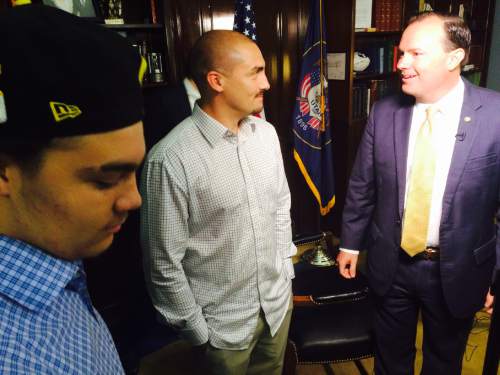This is an archived article that was published on sltrib.com in 2016, and information in the article may be outdated. It is provided only for personal research purposes and may not be reprinted.
It might be a stretch to consider Weldon Angelos a lucky man.
The former music producer from Utah spent more than 12 years in a federal prison, far removed from his three young children, unable to see his father before he died, sitting and watching as other people convicted of similar small-time drug offenses were properly pardoned and released.
But Angelos is free today. Not only that, he was able to come home some 43 years before the end of the sentence he was given for three counts of selling marijuana to an undercover agent, a sentence so severe it shocked even the judge who handed it down.
It would be wonderful if Angelos' release were due to a long-overdue reform of the American criminal justice system, if it resulted from a sweeping policy change of the administration, the Justice Department, the courts or, best of all, an act of Congress.
But that's not what happened.
Which is why real legislation to change the cruel policies that trapped Angelos, and continues to hold many others, should be adopted by Congress just as soon as possible.
Utah's Sen. Mike Lee is among those pushing for such a change. Progress has been slow, mired not so much in partisan politics but in the general inability of Congress to accomplish anything worthwhile, further slowed by the widespread resistance of some politicians to do anything that would allow critics to paint them as "soft on crime."
The legal and procedural details as to how Angelos was released are sealed, so it is hard to know who he has to thank for his freedom, and who the rest of us should credit for restoring some hint of justice to this case.
What is known is that Angelos throughout his ordeal had people in his corner who spoke up on his behalf.
Judge Paul Cassell, who was forced by federal sentencing guidelines to impose such a draconian punishment because the defendant was carrying a gun — a gun that was never fired or even brandished — said from the beginning that the sentence was "unjust and cruel and even irrational." Cassell urged then-President George W. Bush to commute the sentence to something far shorter.
In addition to his family, several hard-working attorneys and the organization Families Against Mandatory Minimums, Angelos also won statements of support from Utah's Sen. Orrin Hatch. Musicians, writers and filmmakers took up his cause.
Which is why it was surprising that, as President Obama occasionally announced the pardon of other federal prisoners whose sentences similarly shocked the conscience, Angelos was not among them.
As long as his time in prison was, the fact that it wasn't much longer is due to some secret vagaries going on out of public view. It isn't what it should be, real reform that will apply to others who have received similar sentences but aren't lucky enough to have so many people pulling for them.
Now, though, they have Weldon Angelos on their side. Last week he traveled to Washington, joining Lee and other advocates in urging Congress to pass sentencing reforms that will spare others from such cruel fates, even as it eases the burden on taxpayers.
Congress should heed his message.



